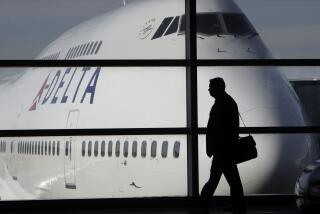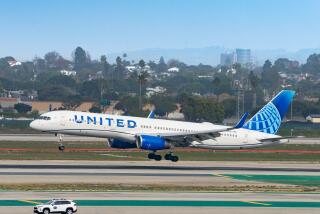Delays Hobble United, Other Carriers
- Share via
A crisis of delays and cancellations plaguing United Airlines deepened Thursday as the world’s largest airline resorted to incentives to keep its lucrative business fliers and warned of disappointing third-quarter earnings because of lost business.
The developments added to United’s growing role as the central figure in passengers’ furor with the U.S. airline industry, which has been hobbled all summer by thousands of flights that have been delayed or canceled because of bad weather, labor protests, air-traffic-control snags and a record numbers of travelers.
Transportation Secretary Rodney Slater, in fact, said Wednesday that United is “the poster child for what is wrong” in the airline business, and he’s called an emergency meeting for Monday to discuss with airline executives, labor officials and airport operators how service can be improved.
United and other carriers, though, point to antiquated systems at the Transportation Department’s Federal Aviation Administration as a key part of the problem. And some analysts said travelers themselves deserve part of the blame because they’re packing jetliners as never before regardless of the system’s faults.
United’s struggle to manage its own operations also is again calling into question the efficacy of its planned purchase of smaller rival US Airways Inc. for $4.3 billion, even if the deal is eventually cleared on antitrust grounds by the Justice Department.
“I believe this issue with United is being viewed by government as a much broader industry issue, and with respect to that proposed merger, I have to believe it’s another nail in the coffin” that will stop that deal, said Kevin Mitchell, chairman of the Business Travel Coalition, an advocacy group for business fliers.
But United’s more immediate concern is keeping its frequent business travelers. They account for less than 10% of United’s passengers, but their high fares generate nearly half of United’s revenue and provide the airline with its highest profit margins.
Amid all the delays, United is especially running the risk that corporate travel managers will steer their employees to other airlines, even if they have contracts naming United as their preferred carrier, Mitchell said.
“When you have a division president coming to you and saying he’ll never fly United again, from that point forward the travel manager has a hard time saying you have to fly United,” he said. And if the problem lingers too long, that corporate account might negotiate its next contract with another airline, he noted.
In a bid to preclude that loss, United said its Mileage Plus Premier frequent-flier members--who normally fly 25,000 miles a year or more--will get an extra 25% in bonus miles for flights between May 1 and Dec. 31. Its Premier Executive and 1K members--who fly more than 50,000 and 100,000 miles a year, respectively, and already get double frequent-flier miles--will get an extra 100% bonus, meaning their miles effectively will be tripled until year’s end.
Also, any passenger flying before Sept. 30 who chooses to extend his or her stay or to change travel dates if an outbound flight is delayed or canceled won’t have to pay the normal $75 service fee. And customers who travel before Sept. 30 who want to postpone their trip can do so without paying the $75 charge, United said. There are some restrictions.
“United plans additional initiatives to restore our customers’ confidence, but our overwhelming priority at this point is restoring the airline’s reliability to acceptable levels,” Graham Atkinson, United’s senior vice president for marketing, said.
But there’s been considerable damage done already. United’s parent company, UAL Corp., said that lost business from the service woes would mean its third-quarter earnings won’t match Wall Street’s forecasts and that the Chicago-based concern cannot confidently project results for the rest of the year.
The company, which had said it expected to lose as much as $150 million in revenue during the quarter ending Sept. 30, said its diluted earnings per share would not match the $2.60-to-$3.20 range it forecast a month ago. The consensus estimate by analysts had been $2.75 a share, according to a survey by First Call/Thomson Financial.
United’s “booking levels have since fallen on the adverse publicity surrounding the cancellations that have occurred in early August,” UAL Chairman James Goodwin said.
Even some analysts admitted that they didn’t see United’s problems getting so bad. “We sorely regret underestimating the severity of the operational/labor problems [at United] this quarter,” analyst Brian Harris of Salomon Smith Barney Inc. in New York said in a bulletin to clients Thursday.
United claims that a big part of the problem is that many of its pilots and mechanics--who are in contentious contract talks with the airline--are not working overtime as usual or are calling in sick, leaving United with crew shortages.
The workers’ unions deny that any organized or even informal job action is taking place, but they don’t dispute that they’re unhappy with United’s contract offers so far and the prospect of losing seniority after the US Airways merger.
“There’s no organized activity,” said Frank Larkin, a spokesman for the International Assn. of Machinists and Aerospace Workers. “We’re not going to compromise anyone’s safety.” But he acknowledged that “the expression of frustration” among some United workers “is more likely to be displayed in somebody declining voluntary overtime.”
United carried 87 million passengers last year, and the airline considers Los Angeles one of its hubs. Earlier this year, United already had eliminated thousands of flights from June through October in response to the expected crew shortages.
Even so, an average of 10% of its remaining 2,400 flights a day are still being canceled, and many others are running into lengthy delays, a spokesman said.
But passengers themselves deserve some of the blame for the industry’s turmoil because they have the urge and the financial ability--especially with leisure fares still relatively low--to fly often in spite of the congestion, analysts said.
“The surprise to me is that no one is pointing to the consumer as having some role in creating the situation,” said Ron Kuhlmann, vice president of Roberts, Roach & Associates, an aviation consulting firm in Hayward, Calif.
“The reason we’re having this problem is because every flight is going out full, and not just at United,” which means it’s extremely hard to find alternative seats when a flight is delayed or canceled, Kuhlmann said. Travelers are “not walking away from the product the way it exists. They’re complaining about it, but they’re buying it anyway.”
UAL’s stock, which already had tumbled 35% so far this year, lost a further 63 cents a share to $48.88 in composite trading Thursday on the New York Stock Exchange.
(BEGIN TEXT OF INFOBOX / INFOGRAPHIC)
Losing Altitude
Delays and cancellations hobbling United Airlines and other U.S. airlines are being blamed on bad weather, labor problems and air-traffic-control troubles, but some also point to the record number of travelers for adding to the congestion.
Airline travel has grown steadily and will explode by 2009 ...
Passengers on U.S. airlines (in millions)
2009 (estimate): 1 billion passengers
... but United has had to cut flights ...
Percent change in number of scheduled departures compared with same month last year
... hurting its earnings forecast and stock price.
Weekly closes and latest for UAL:
Thursday: $48.88, down 63 cents
Sources: Air Transport Assn., U.S. Transportation Department, Bloomberg News
More to Read
Inside the business of entertainment
The Wide Shot brings you news, analysis and insights on everything from streaming wars to production — and what it all means for the future.
You may occasionally receive promotional content from the Los Angeles Times.











